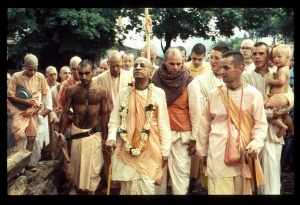CC Adi 8.5: Difference between revisions
m (1 revision(s)) |
(Vanibot #0054 edit - transform synonyms into clickable links, which search similar occurrences) |
||
| (One intermediate revision by one other user not shown) | |||
| Line 1: | Line 1: | ||
{{ | [[Category:Sri Caitanya-caritamrta - Adi-lila Chapter 08|C005]] | ||
<div style="float:left">'''[[Sri Caitanya-caritamrta|Śrī Caitanya-caritāmṛta]] - [[CC Adi|Ādi-līlā]] - [[CC Adi 8|Chapter 8: The Author Receives the Orders of Kṛṣṇa and Guru]]'''</div> | |||
<div style="float:right">[[File:Go-previous.png|link=CC Adi 8.4|Ādi-līlā 8.4]] '''[[CC Adi 8.4|Ādi-līlā 8.4]] - [[CC Adi 8.6|Ādi-līlā 8.6]]''' [[File:Go-next.png|link=CC Adi 8.6|Ādi-līlā 8.6]]</div> | |||
{{CompareVersions|CC|Adi 8.5|CC 1975|CC 1996}} | |||
{{RandomImage}} | |||
==== TEXT 5 ==== | ==== TEXT 5 ==== | ||
<div | <div class="verse"> | ||
mūka kavitva kare yāṅ-sabāra smaraṇe | :mūka kavitva kare yāṅ-sabāra smaraṇe | ||
paṅgu giri laṅghe, andha dekhe tārā-gaṇe | :paṅgu giri laṅghe, andha dekhe tārā-gaṇe | ||
</div> | </div> | ||
| Line 12: | Line 16: | ||
==== SYNONYMS ==== | ==== SYNONYMS ==== | ||
<div | <div class="synonyms"> | ||
''[//vanipedia.org/wiki/Special:VaniSearch?s=mūka&tab=syno_o&ds=1 mūka]'' — dumb; ''[//vanipedia.org/wiki/Special:VaniSearch?s=kavitva&tab=syno_o&ds=1 kavitva]'' — poet; ''[//vanipedia.org/wiki/Special:VaniSearch?s=kare&tab=syno_o&ds=1 kare]'' — becomes; ''[//vanipedia.org/wiki/Special:VaniSearch?s=yāṅ&tab=syno_o&ds=1 yāṅ]'' — whose; ''[//vanipedia.org/wiki/Special:VaniSearch?s=sabāra&tab=syno_o&ds=1 sabāra]'' — all; ''[//vanipedia.org/wiki/Special:VaniSearch?s=smaraṇe&tab=syno_o&ds=1 smaraṇe]'' — by remembering; ''[//vanipedia.org/wiki/Special:VaniSearch?s=paṅgu&tab=syno_o&ds=1 paṅgu]'' — the lame; ''[//vanipedia.org/wiki/Special:VaniSearch?s=giri&tab=syno_o&ds=1 giri]'' — mountains; ''[//vanipedia.org/wiki/Special:VaniSearch?s=laṅghe&tab=syno_o&ds=1 laṅghe]'' — crosses; ''[//vanipedia.org/wiki/Special:VaniSearch?s=andha&tab=syno_o&ds=1 andha]'' — blind; ''[//vanipedia.org/wiki/Special:VaniSearch?s=dekhe&tab=syno_o&ds=1 dekhe]'' — sees; ''[//vanipedia.org/wiki/Special:VaniSearch?s=tārā&tab=syno_o&ds=1 tārā]-[//vanipedia.org/wiki/Special:VaniSearch?s=gaṇe&tab=syno_o&ds=1 gaṇe]'' — the stars. | |||
</div> | </div> | ||
| Line 19: | Line 23: | ||
==== TRANSLATION ==== | ==== TRANSLATION ==== | ||
<div | <div class="translation"> | ||
By remembering the lotus feet of the Pañca-tattva, a dumb man can become a poet, a lame man can cross mountains, and a blind man can see the stars in the sky. | By remembering the lotus feet of the Pañca-tattva, a dumb man can become a poet, a lame man can cross mountains, and a blind man can see the stars in the sky. | ||
</div> | </div> | ||
| Line 26: | Line 30: | ||
==== PURPORT ==== | ==== PURPORT ==== | ||
<div | <div class="purport"> | ||
In Vaiṣṇava philosophy there are three ways for perfection—namely sādhana-siddha, perfection attained by executing devotional service according to the rules and regulations, nitya-siddha, eternal perfection attained by never forgetting Kṛṣṇa at any time, and kṛpā-siddha, perfection attained by the mercy of the spiritual master or another Vaiṣṇava. Kavirāja Gosvāmī here stresses kṛpā-siddha, perfection by the mercy of superior authorities. This mercy does not depend on the qualifications of a devotee. By such mercy, even if a devotee is dumb he can speak or write to glorify the Lord splendidly, even if lame he can cross mountains, and even if blind he can see the stars in the sky. | In Vaiṣṇava philosophy there are three ways for perfection—namely ''sādhana-siddha'', perfection attained by executing devotional service according to the rules and regulations, ''nitya-siddha'', eternal perfection attained by never forgetting Kṛṣṇa at any time, and ''kṛpā-siddha'', perfection attained by the mercy of the spiritual master or another Vaiṣṇava. Kavirāja Gosvāmī here stresses ''kṛpā-siddha'', perfection by the mercy of superior authorities. This mercy does not depend on the qualifications of a devotee. By such mercy, even if a devotee is dumb he can speak or write to glorify the Lord splendidly, even if lame he can cross mountains, and even if blind he can see the stars in the sky. | ||
</div> | </div> | ||
__NOTOC__ | |||
<div style="float:right; clear:both;">[[File:Go-previous.png|link=CC Adi 8.4|Ādi-līlā 8.4]] '''[[CC Adi 8.4|Ādi-līlā 8.4]] - [[CC Adi 8.6|Ādi-līlā 8.6]]''' [[File:Go-next.png|link=CC Adi 8.6|Ādi-līlā 8.6]]</div> | |||
__NOTOC__ | |||
__NOEDITSECTION__ | |||
Latest revision as of 19:20, 19 February 2024

A.C. Bhaktivedanta Swami Prabhupada
TEXT 5
- mūka kavitva kare yāṅ-sabāra smaraṇe
- paṅgu giri laṅghe, andha dekhe tārā-gaṇe
SYNONYMS
mūka — dumb; kavitva — poet; kare — becomes; yāṅ — whose; sabāra — all; smaraṇe — by remembering; paṅgu — the lame; giri — mountains; laṅghe — crosses; andha — blind; dekhe — sees; tārā-gaṇe — the stars.
TRANSLATION
By remembering the lotus feet of the Pañca-tattva, a dumb man can become a poet, a lame man can cross mountains, and a blind man can see the stars in the sky.
PURPORT
In Vaiṣṇava philosophy there are three ways for perfection—namely sādhana-siddha, perfection attained by executing devotional service according to the rules and regulations, nitya-siddha, eternal perfection attained by never forgetting Kṛṣṇa at any time, and kṛpā-siddha, perfection attained by the mercy of the spiritual master or another Vaiṣṇava. Kavirāja Gosvāmī here stresses kṛpā-siddha, perfection by the mercy of superior authorities. This mercy does not depend on the qualifications of a devotee. By such mercy, even if a devotee is dumb he can speak or write to glorify the Lord splendidly, even if lame he can cross mountains, and even if blind he can see the stars in the sky.